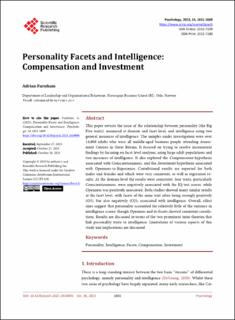Personality Facets and Intelligence: Compensation and Investment
Abstract
This paper revisits the issue of the relationship between personality (the Big Five traits), measured at domain and facet level, and intelligence using two general measures of intelligence. The samples under investigation were over 14,000 adults who were all middle-aged business people attending Assessment Centres in Great Britain. It focused on trying to resolve inconsistent findings by focusing on facet level analyses, using large adult populations and two measures of intelligence. It also explored the Compensation hypothesis associated with Conscientiousness, and the Investment hypothesis associated with Openness-to-Experience. Correlational results are reported for both males and females and which were very consistent, as well as regression results. At the domain level the results were consistent: four traits, particularly Conscientiousness, were negatively associated with the IQ test scores, while Openness was positively associated. Both studies showed many similar results at the facet level, with facets of the same trait often being strongly positively (O5), but also negatively (O2), associated with intelligence. Overall, effect sizes suggest that personality accounted for relatively little of the variance in intelligence scores: though Openness and its facets showed consistent correlations. Results are discussed in terms of the two prominent mini-theories that link personality traits to intelligence. Limitations of various aspects of this study and implications are discussed. Personality Facets and Intelligence: Compensation and Investment
